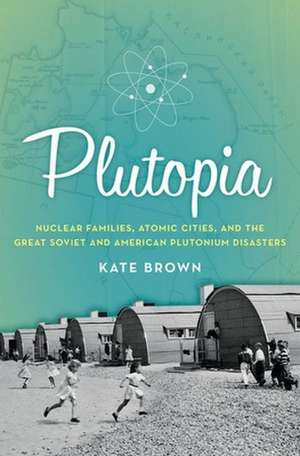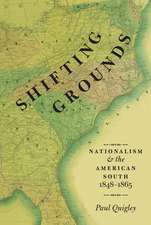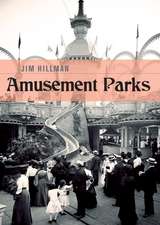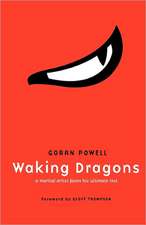Plutopia
Autor Kate Brownen Limba Engleză Paperback
In Plutopia, Brown draws on official records and dozens of interviews to tell the extraordinary stories of Richland, Washington and Ozersk, Russia-the first two cities in the world to produce plutonium. To contain secrets, American and Soviet leaders created plutopias--communities of nuclear families living in highly-subsidized, limited-access atomic cities. Fully employed and medically monitored, the residents of Richland and Ozersk enjoyed all the pleasures of consumer society, while nearby, migrants, prisoners, and soldiers were banned from plutopia--they lived in temporary "staging grounds" and often performed the most dangerous work at the plant. Brown shows that the plants' segregation of permanent and temporary workers and of nuclear and non-nuclear zones created a bubble of immunity, where dumps and accidents were glossed over and plant managers freely embezzled and polluted. In four decades, the Hanford plant near Richland and the Maiak plant near Ozersk each issued at least 200 million curies of radioactive isotopes into the surrounding environment--equaling four Chernobyls--laying waste to hundreds of square miles and contaminating rivers, fields, forests, and food supplies. Because of the decades of secrecy, downwind and downriver neighbors of the plutonium plants had difficulty proving what they suspected, that the rash of illnesses, cancers, and birth defects in their communities were caused by the plants' radioactive emissions. Plutopia was successful because in its zoned-off isolation it appeared to deliver the promises of the American dream and Soviet communism; in reality, it concealed disasters that remain highly unstable and threatening today.
An untold and profoundly important piece of Cold War history, Plutopia invites readers to consider the nuclear footprint left by the arms race and the enormous price of paying for it.
| Toate formatele și edițiile | Preț | Express |
|---|---|---|
| Paperback (1) | 144.32 lei 3-5 săpt. | |
| Oxford University Press – | 144.32 lei 3-5 săpt. | |
| Hardback (1) | 187.60 lei 3-5 săpt. | |
| Oxford University Press – 4 apr 2013 | 187.60 lei 3-5 săpt. |
Preț: 144.32 lei
Nou
Puncte Express: 216
Preț estimativ în valută:
27.62€ • 28.78$ • 22.87£
27.62€ • 28.78$ • 22.87£
Carte disponibilă
Livrare economică 13-27 martie
Preluare comenzi: 021 569.72.76
Specificații
ISBN-13: 9780190233105
ISBN-10: 0190233109
Pagini: 416
Dimensiuni: 152 x 237 x 21 mm
Greutate: 0.57 kg
Editura: Oxford University Press
ISBN-10: 0190233109
Pagini: 416
Dimensiuni: 152 x 237 x 21 mm
Greutate: 0.57 kg
Editura: Oxford University Press
Notă biografică
Kate Brown is Associate Professor of History at the University of Maryland, Baltimore County and the author of A Biography of No Place: From Ethnic Borderland to Soviet Heartland, winner of the American Historical Association's George Louis Beer Prize. A 2009 Guggenheim Fellow, her work has also appeared in the Times Literary Supplement, American Historical Review, Chronicle of Higher Education, and Harper's Magazine Online.
Recenzii
"Turning up a surprising amount of hitherto hidden material and talkative survivors, Brown writes a vivid, often hair-raising history of the great plutonium factories and the privileged cities built around them... Readers will squirm to learn of the high radiation levels workers routinely experienced and the casualness with which wastes poured into the local air, land and rivers... An angry but fascinating account of negligence, incompetence and injustice justified (as it still is) in the name of national security." --Kirkus Reviews (starred review)
"An unflinching and chilling account." --Seattle Times
"Harrowing... Meticulously researched... Plutopia has important messages for those managing today's nuclear facilities, arguing for caution and transparency." --Nature
"One of the Cold War's more striking perversities never made it to public view. ... Brown is a good writer, and she describes with precision the construction of the two sites (a difficult process in the U.S. case, an unbelievably horrid one in the Russian case), the hazardous occupations undertaken by their inhabitants, and the consciously contrived bubbles of socioeconomic inequality both places became." --Foreign Affairs
"Brown's account is unique, partisan and occasionally personal in that she includes some of her thoughts about interviews she conducted... But because she is open and thorough about her sources, those are strengths to be celebrated, not weaknesses to be deplored. It also means her book is engaging, honest and, in the end, entirely credible." --New Scientist
"Kate Brown has written a provocative and original study of two cities -- one American, one Soviet -- at the center of their countries' nuclear weapons complexes. The striking parallels she finds between them help us -- impel us -- to see the Cold War in a new light. Plutopia will be much discussed. It is a fascinating and important book." --David Holloway, author of Stalin and the Bomb
"Kat
"An unflinching and chilling account." --Seattle Times
"Harrowing... Meticulously researched... Plutopia has important messages for those managing today's nuclear facilities, arguing for caution and transparency." --Nature
"One of the Cold War's more striking perversities never made it to public view. ... Brown is a good writer, and she describes with precision the construction of the two sites (a difficult process in the U.S. case, an unbelievably horrid one in the Russian case), the hazardous occupations undertaken by their inhabitants, and the consciously contrived bubbles of socioeconomic inequality both places became." --Foreign Affairs
"Brown's account is unique, partisan and occasionally personal in that she includes some of her thoughts about interviews she conducted... But because she is open and thorough about her sources, those are strengths to be celebrated, not weaknesses to be deplored. It also means her book is engaging, honest and, in the end, entirely credible." --New Scientist
"Kate Brown has written a provocative and original study of two cities -- one American, one Soviet -- at the center of their countries' nuclear weapons complexes. The striking parallels she finds between them help us -- impel us -- to see the Cold War in a new light. Plutopia will be much discussed. It is a fascinating and important book." --David Holloway, author of Stalin and the Bomb
"Kat


















